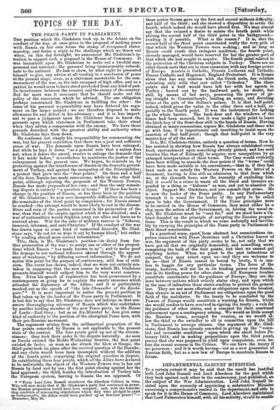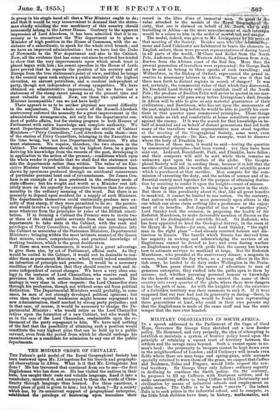DEPARTMENTAL CABINET MINISTERS.
To a certain extent it may be said that the result has justified both Lord John Russell and Lord Aberdeen for the part which they took against each other in the controversy, just -published, on the subject of the War Administration. Lord Sohn Russell in- sisted upon the necessity of appointing a substantive. "Minister exercising a comprehensive control in the department, and able to speak for it in the House of Commons, Lord Aberdeen maintained that Lord Palmerston himself, with all his-activity, would be unable
to grasp in his single hand all that a War Minister ought to do; and that it would be very inconvenient to demand that the states- man chiefly wielding the war machinery of this country should necessarily belong to the Lower House. Contrary to the apparent impression of Lord Aberdeen, it has been admitted that it is ne- cessary so to reconstruct the War department as to place a Minister of high position in the House of Commons, with the as- sistance of a subordinate, to speak for the whole civil branch; and we have an improved administration : but we have lost the Duke of Newcastle to the War department and also to the Cabinet. Now, all the evidence that has come out since he retired has tended to show that the very improvements upon which much trust is placed began with him ; his recent speeches in the House of Lords have proved that he regards the position of his country and of Europe from the true statesman's point of view, and that he brings to the council upon such subjects a public morality of the highest elevation, an earnest patriotism, and a candour independent of party, though not independent of strong sympathies. We have obtained an administrative improvement,, but we have lost a statesman of the stamp rarest among us at the present time and most valuable in council. Now, are these two qualities of a Minister incompatible ? can we not have both?
There appears to us to be neither physical nor moral difficulty in the conjuncture. The whole course of the Russell-Aberdeen controversy enforced the necessity for a great improvement in the administrative arrangements, not only for the departmental con- duct of public affairs, but for stating progress to both Houses of Parliament with entire knowledge and complete authority. We want Departmental Ministers occupying the station of Cabinet Ministers—"Privy Councillors," Lord Aberdeen calls them—men of the station of Privy Councillors, belonging to the Executive for the time being, but not less Departmental Ministers. We also want statesmen. We require, therefore, the two classes in the Cabinet. The statesman should, in his highest form, be a genius deriving his knowledge from the records of the past, developing it in application to the action of the present,—conditions which upon the whole render it probable that we shall find the statesmen out- side the departments rather than within. The value of an Exe- cutive Minister trained within departments has sometimes been shown by specimens produced through an accidental concurrence of particular personal bent and of circumstances. Sir James Gra- ham is an example of a man produced in the ordinary mode of state officers ; but his weight and worth as a Minister rest infi- nitely more on his capacity for executive business than for states- manship in the ordinary meaning of the word. But there is no necessity to depend upon accident for a supply of such Ministers. The departments themselves could continually produce men ex- actly of that stamp, if they were permitted to do so; the permis- sion would involve a very *flight departure from our practice, and none whatever from the principles or rules of the British consti- tution. If in forming a Cabinet the Premier were to invite two or three of the ablest public servants from the most important departments to take seats in the Cabinet, with the rank and privileges of Privy Councillors, we should at once introduce into the Cabinet as associates of the Statesmen Ministers, Departmental Ministers; bringing within the most intimate counsel of the Queen that minute, exact, comprehensive, and practical knowledge of working business, which is the great desideratum.
If these men were Commoners, it would be a great advantage to give them also, by act of Parliament, official seats. As they would be united tO the Cabinet, it would not be desirable to con- sider them as permanent Ministers; which would indeed constitute an infraction of principle and practice. It would be a necessary oondition of their elevation that they should receive rank and in- come independent of casual changes. We have a very close ana- logy in the instance of Lord Chancellors, who receive rank and provision for life, with certain limitations as to number. The analogy is very close in other respects : the Lord Chancellor rises through his profession, though not without some aid from political distinction. The Departmental Ministers would probably, in some cases, be men of not strongly developed political opinions; but even then their reputed tendencies might become repugnant to a new Administration, itself marked by strong party prejudice; and in that case, of course, it would be necessary to change the De- partmental Minister ; who would retire as the Lord Chancellor retires upon the formation of a new Cabinet, but who would be, as in the case of the Lord Chancellor, readmissible upon the re- tirement of the party repugnant to him. We have said nothing of the fact that the possibility of attaining such a position would constitute the very highest prize that can be held up to a public servant, even from the period from which he should undergo his examination as a candidate for admission to any one of the public departments.



























 Previous page
Previous page